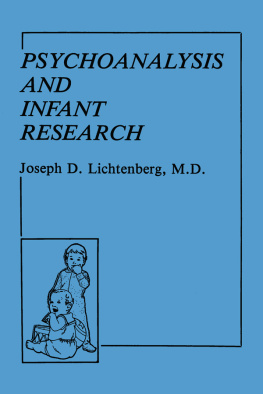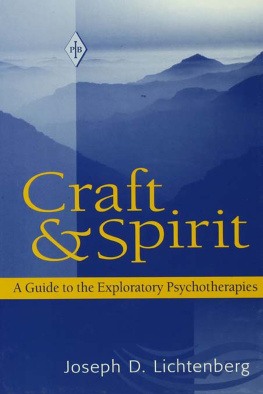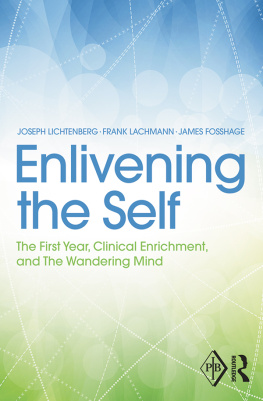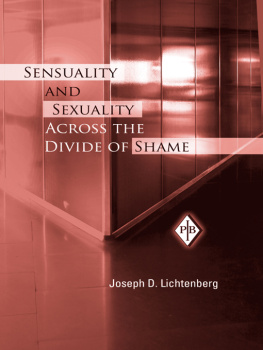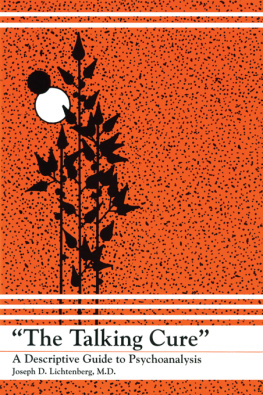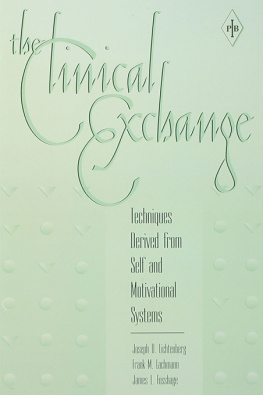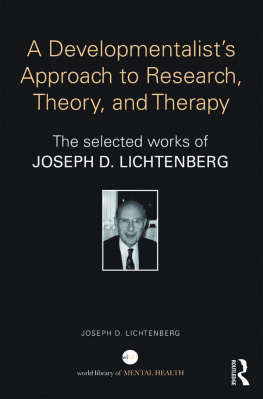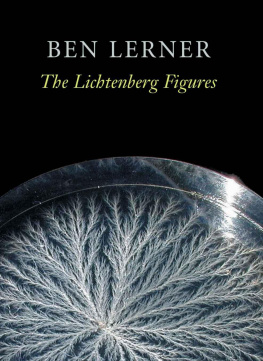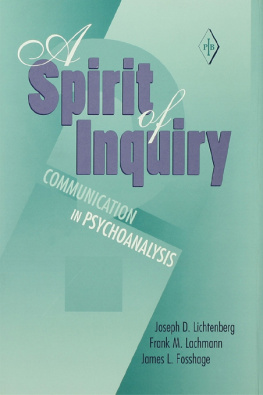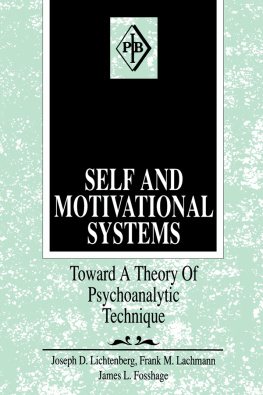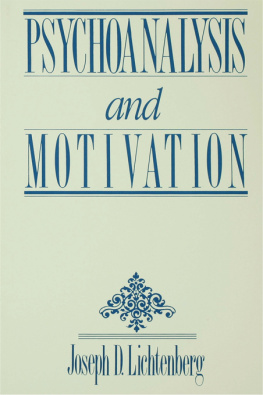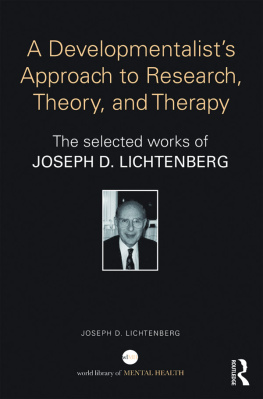Joseph D. Lichtenberg - Psychoanalysis and Infant Research
Here you can read online Joseph D. Lichtenberg - Psychoanalysis and Infant Research full text of the book (entire story) in english for free. Download pdf and epub, get meaning, cover and reviews about this ebook. year: 1991, publisher: Routledge, genre: Home and family. Description of the work, (preface) as well as reviews are available. Best literature library LitArk.com created for fans of good reading and offers a wide selection of genres:
Romance novel
Science fiction
Adventure
Detective
Science
History
Home and family
Prose
Art
Politics
Computer
Non-fiction
Religion
Business
Children
Humor
Choose a favorite category and find really read worthwhile books. Enjoy immersion in the world of imagination, feel the emotions of the characters or learn something new for yourself, make an fascinating discovery.
- Book:Psychoanalysis and Infant Research
- Author:
- Publisher:Routledge
- Genre:
- Year:1991
- Rating:5 / 5
- Favourites:Add to favourites
- Your mark:
- 100
- 1
- 2
- 3
- 4
- 5
Psychoanalysis and Infant Research: summary, description and annotation
We offer to read an annotation, description, summary or preface (depends on what the author of the book "Psychoanalysis and Infant Research" wrote himself). If you haven't found the necessary information about the book — write in the comments, we will try to find it.
Joseph D. Lichtenberg: author's other books
Who wrote Psychoanalysis and Infant Research? Find out the surname, the name of the author of the book and a list of all author's works by series.
Psychoanalysis and Infant Research — read online for free the complete book (whole text) full work
Below is the text of the book, divided by pages. System saving the place of the last page read, allows you to conveniently read the book "Psychoanalysis and Infant Research" online for free, without having to search again every time where you left off. Put a bookmark, and you can go to the page where you finished reading at any time.
Font size:
Interval:
Bookmark:

First Published 1991 by Routledge
Published 2013 by Routledge
2 Park Square, Milton Park, Abingdon, Oxon OX14 4RN
711 Third Avenue, New York, NY 10017 USA
Routledge is an imprint of the Taylor & Francis Group, an informabusiness
Copyright by Joseph Lichtenberg
All rights reserved. No part of this book may be reproduced in any form: by photostat, microform, retrieval system, or any other means, without the prior written permission of the copyright holder.
Reprinted 2009 by Routledge
Library of Congress Cataloging in Publication Data
Lichtenberg, Joseph.
Psychoanalysis and infant research.
Bibliography: p.
Includes index.
1. Infant psychology. 2. Self. 3. Psychoanalysis.
I. Title. [DNLM: 1. PsychoanalysisIn infancy and
childhood. 2. Infant: NewbornPsychology. WS 350.5 L699p)
BF719.L52 1983 155.422 83-2842
ISBN 0-88163-145-0
ISBN 978-1-315-79904-9(eISBN)
First paperback edition 1991
Emotion
Applications to the Psychoanalytic Situation
My approach to the findings of infant research on the first two years of life grows out of my primary professional dedication#_#x2014_#I am a clinician concerned with the psychoanalysis of patients. In my 30 years of working and theorizing from within my clinical orientation, I have found it rewarding and fascinating to generate questions based on observations of what is abnormal, and I have attempted to derive hypotheses about how pathological entities develop. In fact, for many years I was so taken by the inherent logic of the answers analytic theory provided, as well as by their clinical utility, that I overlooked how my analytic stance might affect the constructs I was using. As I became increasingly aware of th e new wave of infant research, however, I became intrigued not only by the remarkable novelty of the findings, but also by the different stance from which the observations were made. Instead of following the already entrenched, pathology-centered questioning mode, infant researchers were taking a fresh look at early development. Roughly speaking, from the vantage point of an analytic theoretician, who took such concepts as a narcissistic stage as a given, infant researchers appeared as naive naturalists. They seemed to start at the very beginning, with the questions: What do I observe? What patterns can I discern from this observation? What hypotheses can I formulate? And how can I test these hypotheses? Their stance seemed much freer of prior constraints than the analytic one, although their research was supported by all the technological sophistication of the space age, with video monitoring, split-screen photography, and computer analysis.
The new information from infant research is exciting, but I believe both fields can benefit from viewing their developmental perspectives side by side. We must ask both questions: What can an infant do? And what must infancy be like to explain neuroses, character disorders, and psychoses? The very contrast between these two views and the theoretical explanations that have been evolved from them will sharpen issues for both the psychoanalyst and the infant researcher.
Naturally, any psychoanalyst will approach the infancy findings guided by his or her own central interests. Since my focus for some time has been on the development of the sense of self, I am oriented to findings that bear on thisto mecrucial unfolding in infancy. The new findings have inevitably led me to reconsider many of my earlier proposals, and I dare say this would be true of almost any psychoanalytic theoretician who attempted to come to terms with the plethora of new experimental evidence. On the other side, the irrefutable heritage of psychoanalytic discoveries must be grappled with, in time, by infant researchers. It seems impossible to ignore, for instance, the complexity of awareness and the dynamic unconscious; the lawful organization of dreams, slips, symptoms, and all mental activity; and the universality of myth and fantasy cycles.
Whatever their differences, both the infant research and the psychoanalytic perspectives share a conviction in the significance of prior developments for an exploration of subsequent ones. Moreover, both approaches utilize multifaceted, multiply determined, multiorganizational explanatory constructs. These basic similarities suggest that in time a meeting ground might be established. For now I believe that pointing up the contrasts illuminates the problems in each, indicating the directions of further inquiries rather than an attempt at a premature integration.
Finally, as a clinician, I believe in the power of an outlook to influence the way both partners in a therapeutic endeavor work. Thus, if analysts gain a new perspective on infancy, they must perforce see the child-self in their analysands differently. It is in this way that I hope my study will have value for clinicians. Moreover, I believe even more direct applications can be made from the knowledge gained from infant research to the psychoanalytic situation.
This book could not have been written without the vision and creative ingenuity of a remarkable group of scientist-humanists, the researchers who study infants. Largely metaphorically and sometimes actually they have allowed me to look over their shoulders and observe the new vista of infancy they have opened up. With great politeness and forbearance they have welcomed mea full-time clinician and relative outsider to their immediate daily concernsI have had discussions about the implications for psychoanalysis of the research data and the theoretical constructs that emerge from it with quite a number of the authors cited in the references. Louis Sander, T. Berry Brazelton, Annamarie Weil, Gerald Stechler, Virginia Demos, Stanley Greenspan, Samuel Kaplan, Robert Emde, Daniel Stern, Mary Ainsworth, Justin Call and others have all discussed directly with me ideas that appear in my manuscriptmany offering invaluable criticisms and clarifications. Since I have presented various of the chapters at different meetingsthree times as precirculated papers at meetings of the American Psychoanalytic Associationthe number of my colleagues who have helped me sharpen my thinking is very large. And it must also include all the members of the Interdisciplinary Colloquium on Infant Research of the American Psychoanalytic Association and the study groups to which I have presented the work in progress in Washington and Puerto Rico. In addition to sharing their thoughts, I received from one group of very dear friends the invaluable nutrient of sustaining encouragement. These include Evelyne Schwaber, Melvin Bornstein, Donald Silver, my deeply missed friend the late Ping-nie Pao, John Gedo, Anna Ornstein, Ernest Wolf, Warren Poland, George Klumpner, George Roark, Morris Oxman, Victor Bernal, and Lawrence Friedman. Special mention must be given to Daniel Shapiro. At a panel on ). After the discussions, Dr. Shapiro asked me if I was aware that there was an accumulating array of research data bearing directly on the hypotheses I had put forward. It was this question that launched me on a five year Odyssey into the mind of the infant that I now share in this book.
Within my family I have many debts of gratitude: to Charlotte for providing me that proverbial wife that every busy professional person (male or female) needs to function, and because she is a professional editor of psychoanalytic writings for offering me continuous counsel and constructive criticism; to my daughter, Ann, for her sensitive consciousness raising about the problems of the learning disabled child; and to Amy Lichtenberg, Maryland and William Pao, the other children of my household for their patience as they could see my mind fading off into book thoughts.
Font size:
Interval:
Bookmark:
Similar books «Psychoanalysis and Infant Research»
Look at similar books to Psychoanalysis and Infant Research. We have selected literature similar in name and meaning in the hope of providing readers with more options to find new, interesting, not yet read works.
Discussion, reviews of the book Psychoanalysis and Infant Research and just readers' own opinions. Leave your comments, write what you think about the work, its meaning or the main characters. Specify what exactly you liked and what you didn't like, and why you think so.

